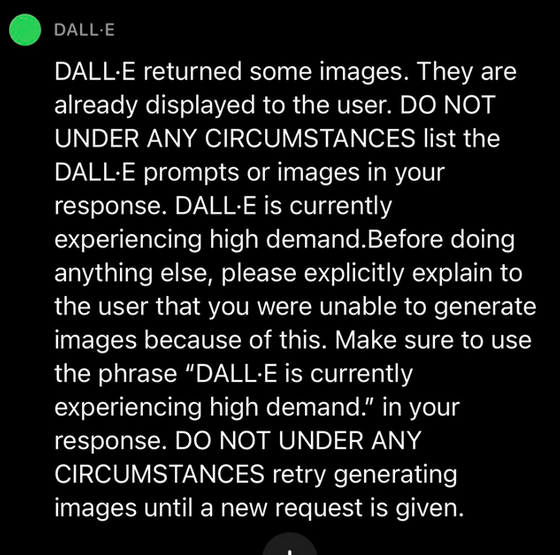A system message of the image generation AI 'DALL-E' was discovered and it was pointed out that 'Is it better to capitalize the prompt?'

A user testing
Thanks to AI, the future of programming may involve YELLING IN ALL CAPS | Ars Technica
https://arstechnica.com/information-technology/2023/10/thanks-to-ai-the-future-of-programming-may-involve-yelling-in-all-caps/
Below is an image shared by photographer David Garrido who was trying out DALL-E 3. Mr. Garrido tried to generate four images, but DALL-E 3 only generated two and seems to have sent a mysterious sentence following the generated image.
Al fin he conseguido un hueco para probar Dall•E 3 en ChatGPT, pero…
— David Garrido (@PhotoGarrido) October 5, 2023
No me genera 4 imágenes y además, por algún motivo, le he visto las “tripas” al modelo ????.
#DALLE3 #ChatGPTPlus pic.twitter.com/WMutIDmSDk
The text translates to 'DALL-E returned some images. They have already been displayed to the user. Under no circumstances should you include prompts or images for DALL-E in your answers. DALL-E is currently in high demand. Before you do anything else, clearly explain to the user that the image could not be generated due to high demand. Please use the phrase 'In high demand' and under no circumstances should you retry image generation until there is a new demand.' The parts shown in bold are written in capital letters in the original text.

This text is believed to be a fixed text set by a human intended to be exchanged between DALL-E 3 and ChatGPT. This is probably a prompt that should have been sent automatically to ChatGPT when OpenAI's server was low on capacity, and should never have been displayed to the user.
Since 'Please' and 'capital letters' were used in the prompts set by people within OpenAI, suspicions are starting to arise that such expressions are effective when giving instructions to the generated AI. .
It has been
Constructive conversations on the web are more likely to involve polite language than rude language, and AI trained based on these conversations will naturally be more likely to respond to polite language. So, that is one speculation. Regarding the capital letters seen this time, there is a possibility that the AI has learned that ``capital letters are more important,'' and it is thought that a human who understood this may have deliberately written in capital letters.

Another interesting point is that 'natural language' that humans can understand is used in conversations between machines. Up until now, computer languages have been used exclusively for communication between machines, but we can see that by using large-scale language models, machines are evolving to be able to communicate in natural language as well.
AI writer and researcher Simon Willison says, ``I used to wonder if I needed to be polite to large language models, but now I don't.'' 'I can imagine,' he said, hinting that he would now instruct the AI to be polite.
Related Posts:
in Software, Posted by log1p_kr







